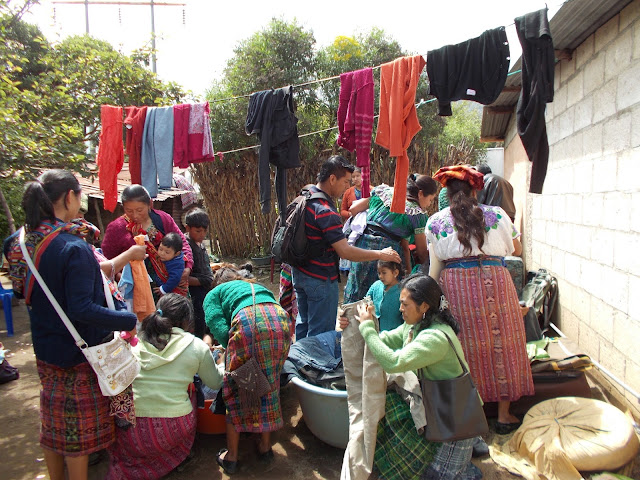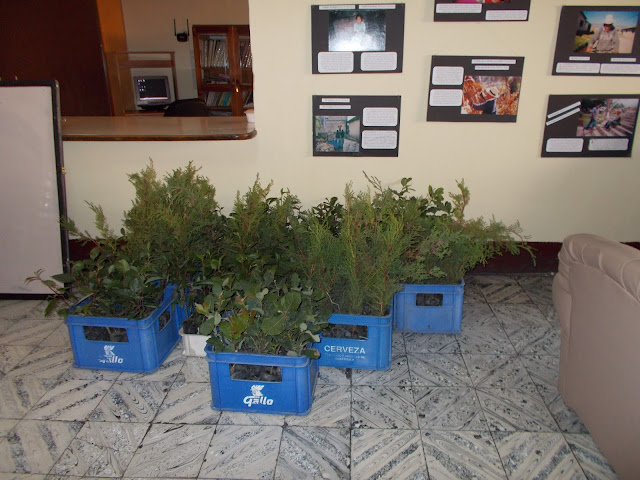Puede encontrar la traducción a español abajo.
Guest blog by Sarah Phoenix, a current Pop Wuj Social Work Spanish student.
Guest blog by Sarah Phoenix, a current Pop Wuj Social Work Spanish student.
Malnutrition is a pervasive problem in many
Guatemalan communities, and infant malnutrition especially can lead to serious
lifelong problems. Because prenatal nutrition is often lacking, many Guatemalan
babies are born already malnourished.
Since 2011, Pop Wuj’s
nutrition program has worked to both prevent and treat infant and toddler
malnutrition in three rural communities near Xela. Pop Wuj and Timmy GlobalHealth are collaborating on the challenging task of finding new and better ways
to help young children who are already experiencing the effects of
malnutrition. Mani+ is proving helpful for malnourished children up to three years old. Another supplement,
Nutributter, works to prevent malnutrition in babies who are at risk.
The program works with malnourished babies
up to three years old, and provides prenatal vitamins to their mothers and
vitamins to their older siblings up to 12 years of age. Depending on their situation, some babies remain in the program until they turn three years old.
Last week, the Pop Wuj nutrition program
made its monthly visit to La Victoria—one of the three communities served by
the program.
Monthly meetings begin with weighing and
measuring each baby in order to track his or her growth. Pop Wuj staff and Pop Wuj Social Work students conduct intake interviews with any new mothers and babies
in order to understand each family’s economic, health, and living situations.
Babies can qualify for program participation based on their height- or weight-for-age,
or based on various socioeconomic risk factors for malnutrition.
Last week three new sets of mothers and
babies joined the group of about 30 families in attendance in La Victoria.
As part of the monthly meetings, mothers
participate in a short lecture on health or nutrition. Last week, Pop Wuj’s nurse, Luby,
gave an educational talk on the importance of seeking medical attention before
trying to treat sick babies at home. This is especially important because of
the easy access to various medicines at local Guatemalan pharmacies. Luby stressed the dangers of giving babies
antibiotics or other drugs without first consulting a doctor at a local clinic.
Throughout the morning, toddlers and older
siblings played outside and on the floor, while smaller babies watched with
wide eyes from their mother's backs.
 |
| Photo by Sarah Phoenix |
 |
| Photo by Jeff Leventhal |
After Luby and the social work students
passed out the nutritional supplements to the mothers of the healthy babies,
the two doctors in the program had appointments with the sick babies. Babies
who lack adequate nutrition often suffer from chronic colds and infections, so
“sick baby appointments” are an important part of each month’s meeting.
This week, the nutrition program heads to
Llanos del Pinal and then to Buena Vista the following week.
Pop Wuj Ataca a Desnutrición
Desde 2011, el programa de nutrición de Pop Wuj ha trabajado para prevenir y tratar la desnutrición infantil en tres comunidades rurales cerca de Xela. Pop Wuj y Timmy Global Health están colaborando en la difícil tarea de encontrar nuevas y mejores formas de ayudar a los niños pequeños que ya están experimentando los efectos de la desnutrición. Maní+ está resultando útil para los niños desnutridos hasta tres años de edad. Otro suplemento, Nutributter, trabaja para prevenir la desnutrición en los bebés que están en riesgo.
La semana pasada, el programa de nutrición Pop Wuj hizo su visita mensual a La Victoria, una de las tres comunidades atendidas por el programa.
Las reuniones mensuales comienzan con pesar y medir cada bebé con el fin de realizar un seguimiento de su crecimiento. El personal de Pop Wuj y sus estudiantes de Trabajo Social realizan entrevistas de admisión con nuevas madres y los bebés con el fin de comprender las situaciones económicas, de salud, y de vida de cada familia. Los bebés entran al programa en base de su altura, peso para la edad, o en base de varios factores de riesgo socioeconómicos de la desnutrición.
La desnutrición es un problema común en muchas comunidades guatemaltecas, y la desnutrición infantil en particular puede provocar graves problemas de largo plazo. Debido a que la nutrición prenatal es a menudo insuficiente, muchos bebés guatemaltecos nacen ya desnutridos.
El programa trabaja con bebes desnutridos hasta tres años de edad. También se proporciona las vitaminas prenatales a sus madres y vitaminas para sus hermanos menores de 12 años de edad. Dependiendo de su situación, algunos bebés permanecen en el programa hasta que cumplan tres años de edad.
Pop Wuj Ataca a Desnutrición
Desde 2011, el programa de nutrición de Pop Wuj ha trabajado para prevenir y tratar la desnutrición infantil en tres comunidades rurales cerca de Xela. Pop Wuj y Timmy Global Health están colaborando en la difícil tarea de encontrar nuevas y mejores formas de ayudar a los niños pequeños que ya están experimentando los efectos de la desnutrición. Maní+ está resultando útil para los niños desnutridos hasta tres años de edad. Otro suplemento, Nutributter, trabaja para prevenir la desnutrición en los bebés que están en riesgo.
La semana pasada, el programa de nutrición Pop Wuj hizo su visita mensual a La Victoria, una de las tres comunidades atendidas por el programa.
Las reuniones mensuales comienzan con pesar y medir cada bebé con el fin de realizar un seguimiento de su crecimiento. El personal de Pop Wuj y sus estudiantes de Trabajo Social realizan entrevistas de admisión con nuevas madres y los bebés con el fin de comprender las situaciones económicas, de salud, y de vida de cada familia. Los bebés entran al programa en base de su altura, peso para la edad, o en base de varios factores de riesgo socioeconómicos de la desnutrición.
La desnutrición es un problema común en muchas comunidades guatemaltecas, y la desnutrición infantil en particular puede provocar graves problemas de largo plazo. Debido a que la nutrición prenatal es a menudo insuficiente, muchos bebés guatemaltecos nacen ya desnutridos.
El programa trabaja con bebes desnutridos hasta tres años de edad. También se proporciona las vitaminas prenatales a sus madres y vitaminas para sus hermanos menores de 12 años de edad. Dependiendo de su situación, algunos bebés permanecen en el programa hasta que cumplan tres años de edad.
















































